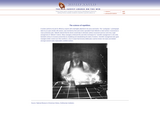
A worker performs his job for efficiency experts with small lights attached to his arms and hands. This "cyclegraph," a photograph taken by an open-shutter still camera, was invented by time-and-motion specialist Frank Gilbreth to chart workers' movements in mass-production jobs. Gilbreth claimed that the device would help to eliminate useless movement and turn work into a rigid arrangement of "efficient" motions. Many managers embraced this and other techniques for "scientific management" in the early twentieth century to increase productivity by simplifying and standardizing the tasks of workers. Scientific management also gave managers better control over their workforce, since it meant that formerly skilled jobs could be broken into tasks and divided amongst several easily replaceable unskilled workers.
- Subject:
- Social Studies
- U.S. History
- Material Type:
- Primary Source
- Reading
- Provider:
- American Social History Project / Center for History Media and Learning
- Provider Set:
- Many Pasts (CHNM/ASHP)
- Author:
- Center for History and New Media/American Social History Project
- Date Added:
- 11/02/2017